NCOAE Blog
We Did It! NCOAE is Now Accredited by Cognia
AccreditationLast September, we told you we were seeking accreditation from a trio of the nation’s top accrediting bodies: the Southern Association of Colleges and Schools Council on Accreditation and School Improvement (SACS CASI), the North Central Association Commission on Accreditation and School Improvement (NCA CASI), and the Northwest Accreditation Commission (NWAC).
And today, we’re pleased to share that Cognia — the parent organization of the above-mentioned agencies — has officially granted The National Center for Outdoor & Adventure Education (NCOAE) full accreditation status. This is a huge milestone for us, and even more so for the students and families we serve.
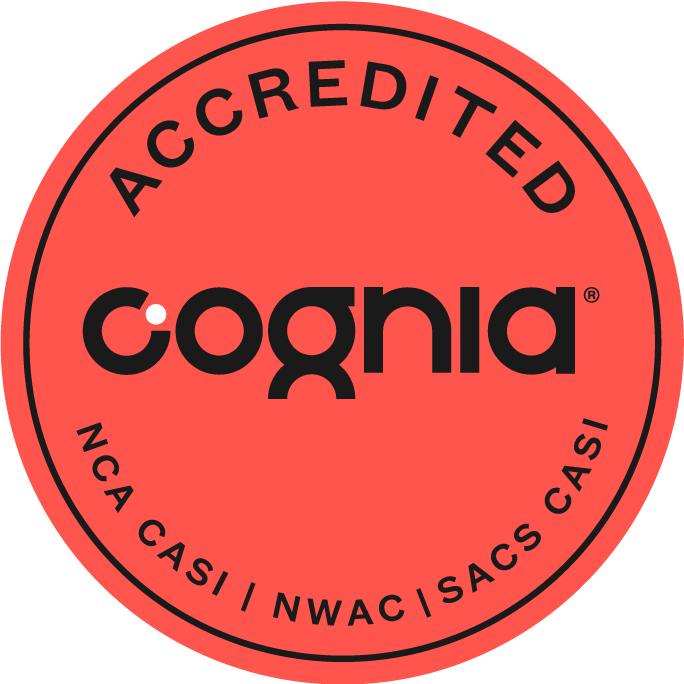
What Cognia Accreditation Means for NCOAE Students and Partners
This recognition confirms that NCOAE meets Cognia’s rigorous performance standards, which are the same standards applied to traditional schools, education service providers, and school districts across the country and around the world. More important, it means that students who complete select NCOAE programs — including our High School Summer Block-Semester — may now be eligible to earn and transfer academic credit to their high school.
We’ve always believed that wilderness and the backcountry is a powerful classroom. Now, it’s also an accredited one.
Why Cognia Accreditation Matters
Cognia is a globally respected nonprofit that accredits more than 36,000 schools and education providers in over 90 countries. Through its regional agencies, Cognia is recognized by the U.S. Department of Education. Its rigorous evaluation process ensures that institutions like ours deliver high-quality, student-centered learning.
By earning this accreditation, NCOAE: (more…)
Preview: Summer 2025 Teen Leadership Expeditions
Teen ExpeditionsChances are good that you’ve had to take at least one course in English composition that required you to write a 500-word essay entitled, “How I Spent My Summer Vacation.” Most teens talk about their vacation or their summer job, but you can talk about leadership activities for teens.
Perhaps you had the best summer ever and found yourself struggling to limit your prose to a paltry 500 words. However, most students have trouble finding enough verbosity to attain the required verbiage.
Don’t let that happen to you. You can make this summer the one you’ll never forget!
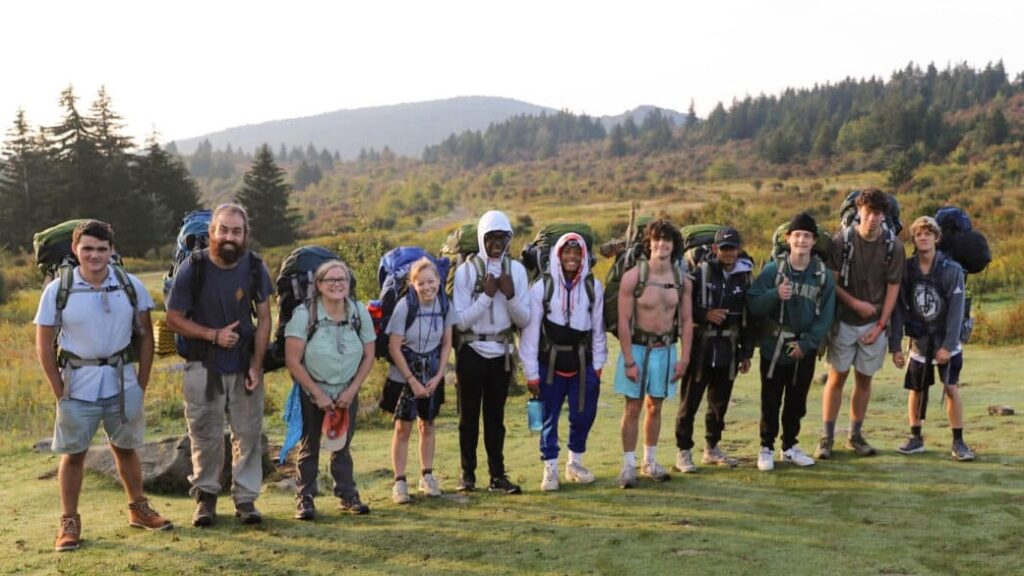
Explore the outdoors while building your technical outdoor skills on a Teen Leadership Expedition this summer with us here at The National Center for Outdoor & Adventure Education (NCOAE).
For 2025, we are offering several 14-day summer camp courses designed specifically as teen leadership activities. Based in Alaska, North Carolina, and the Pacific Northwest, these guided expeditions offer the perfect blend of outdoor adventure, hands-on experiential education, camaraderie, and fun in some of the most awesome wilderness settings in the United States!
Our 14-day teen expeditions feature a ton of adventure, with exciting outdoor activities that include backpacking, mountaineering, trekking, and rock climbing — not to mention paddling activities like canoeing, kayaking, or whitewater rafting.
Here’s what you should know about each destination and course, starting with our two-week Alaska Teen Leadership Expedition. (more…)
Oxygen at Altitude is a Major Consideration in Wilderness Medicine
Wilderness MedicineWilderness medicine covers an enormous area of study and practice. From anaphylaxis to zoonotic diseases, it covers a lot of glossary. From deep-water diving to high-altitude mountaineering, it covers a lot of territory including oxygen deprivation.
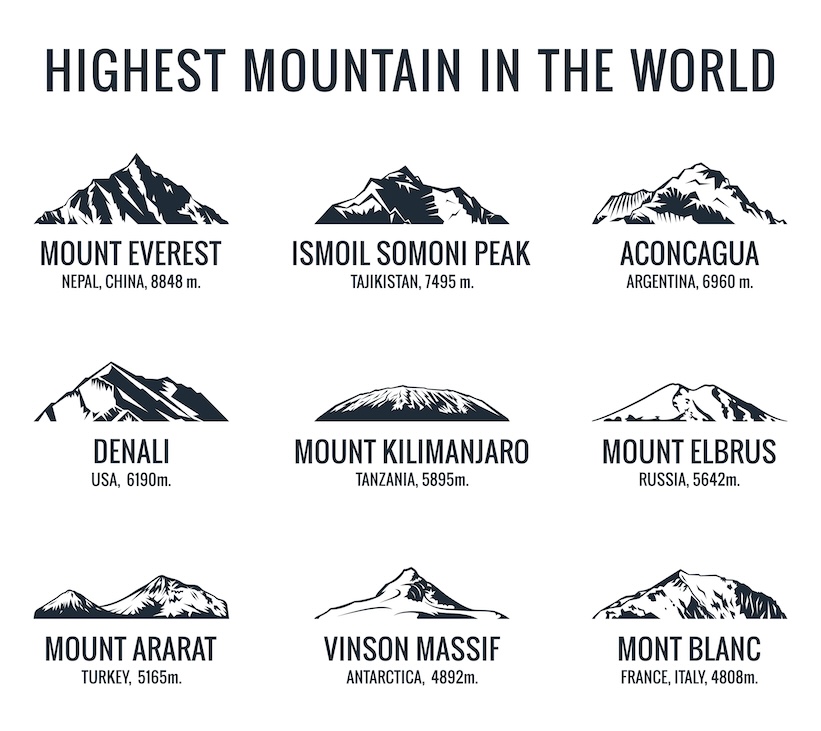
Mountain tourist vector logos set. Adventures Icon mount. Highest mountain in world. Everest and Ismoil Somoni Peak, Aconcagua, Denali, McKinley, Kilimanjaro, Elbrus, Ararat, Vinson Massif, Mont Blanc
In this post about wilderness medicine, we focus on four terms in that glossary to which every outdoor educator and backcountry/wilderness guide should be aware:
Oxygen is a gas comprised of two oxygen molecules bound together (O2), that’s essential for the survival of most earthly lifeforms. You can live without food for several weeks, without water for several days, but only a few minutes without oxygen.
Atmosphere is the gaseous mass that surrounds a celestial body like Earth. Earth’s atmosphere is composed of about 78 percent nitrogen, 21 percent oxygen, 0.93 percent argon, and 0.04 percent carbon dioxide, along with trace amounts of other gases and variable water vapor. This gaseous “envelope” is divided into layers ranging from the troposphere to the thermosphere, with the percentage of oxygen remaining the same in each of those layers. (more…)
Campfires Should Be Designed to Delight — and then Disappear
Leave No TraceLittle in the wilderness experience quite compares to sitting around a warm campfire after a day on the trail. Crackling embers, shimmering luminescence, and radiant warmth have an almost primal attraction.
When you take advantage of our teen leadership expeditions, adult leadership expeditions, or our high school summer semester, you’ll experience many campfires.
Whether you’re toasting marshmallows, sharing stories, debriefing the day’s group-based activities, or simply gazing into the glow, a campfire creates an intimate connection to nature, to others, and to oneself.
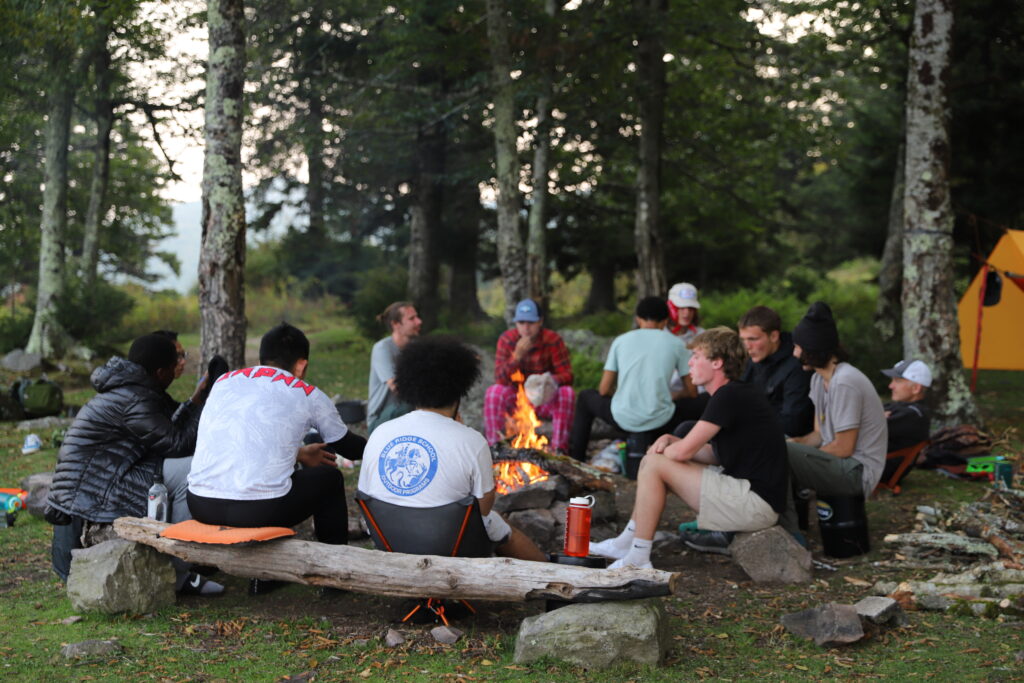
For those of us who work in outdoor education and adventure-based programming, the impact of a campfire on our students must include consideration of the environmental impact of these moon-lit activities. In this blog post, we explore why people are so drawn to campfires and then we share tips on how to enjoy them without leaving a lasting trace.
Appreciating the Appeal of Campfires
People are naturally drawn to campfires, and for good reason — actually several good reasons. Here are some of the qualities that make campfires so alluring (more…)
Just the Facts: Recognizing the Importance of Reporting Accurate Information in a Wilderness Emergency
Wilderness MedicineIn the movie Die Hard 2, hero John McLane, played by Bruce Willis, receives a fax at a car rental kiosk at Dulles International Airport in Washington, D.C. informing him of the identity of a suspect. The agent behind the desk, who’s been flirting with McLane through the entire scene, says, “Hey, I close in about an hour. Maybe we can go get a drink?” McLane smiles coyly, points to the wedding ring on his finger, and replies, “Just the fax, ma’am. Just the fax.”

McLane’s line is a reference to the old TV show Dragnet, where the main character, Sgt. Joe Friday, would remind rambling or opiniated witnesses to stick to the facts by saying, “Just the facts, ma’am [or sir]. Just the facts.” That straight-forward statement can serve as a reminder for wilderness medicine providers when we’re responding to accidents or emergencies in remote settings.
In wilderness emergency medicine, collecting and reporting the facts can determine the difference between a positive and a negative outcome, or even between life and death.
Recognizing the Challenges of Reporting Accurate Information in Wilderness Medicine
In wilderness settings, the potential for communicating inaccurate information increases due to several factors, including distance, time lags, layers of patient care providers, and unreliable communication channels, including the absence of cell phone connectivity. First responders frequently face the daunting task of gathering information from people in stressful situations under challenging and changing conditions. In our wilderness medicine course, we teach about the importance of accurate information.
In addition, location information can be difficult to obtain and communicate. Even in an urban setting, first responders can have trouble distinguishing between similarly named roads, such as Bear Hollow Lane and Bear Hollow Road, or roads that have multiple names. In the wilderness, determining and communicating a specific location becomes even more challenging when certain ridges, pitches of a rock climb, or similarly named streams come into play.
Providing accurate and comprehensive information is important for several reasons, including the following: (more…)
Making Education Loud, Exciting, Exhausting, Dirty — and Transformative
Experiential EducationCovered in mud, we return to the sterile walls of the school. Nearby, students and teachers stop and stare at us. We say nothing. We keep moving, exhausted from our time spent in the wilderness, observing, interacting, developing skills to survive, absorbing information and processing the incredible time we had spent as a group.
What we experienced together as a class is a far cry from what most students find in a traditional educational setting. In that scenario, a teacher lectures from a lesson plan they wrote a decade ago or downloaded online. Students stare out the window, whisper to each another about things unrelated to subject matter, or they concentrate on their rectangular cell phones. Somebody might look up and ask whether what the teacher is saying will be on the test. Curriculum standards have changed little, nor has the teacher’s approach.
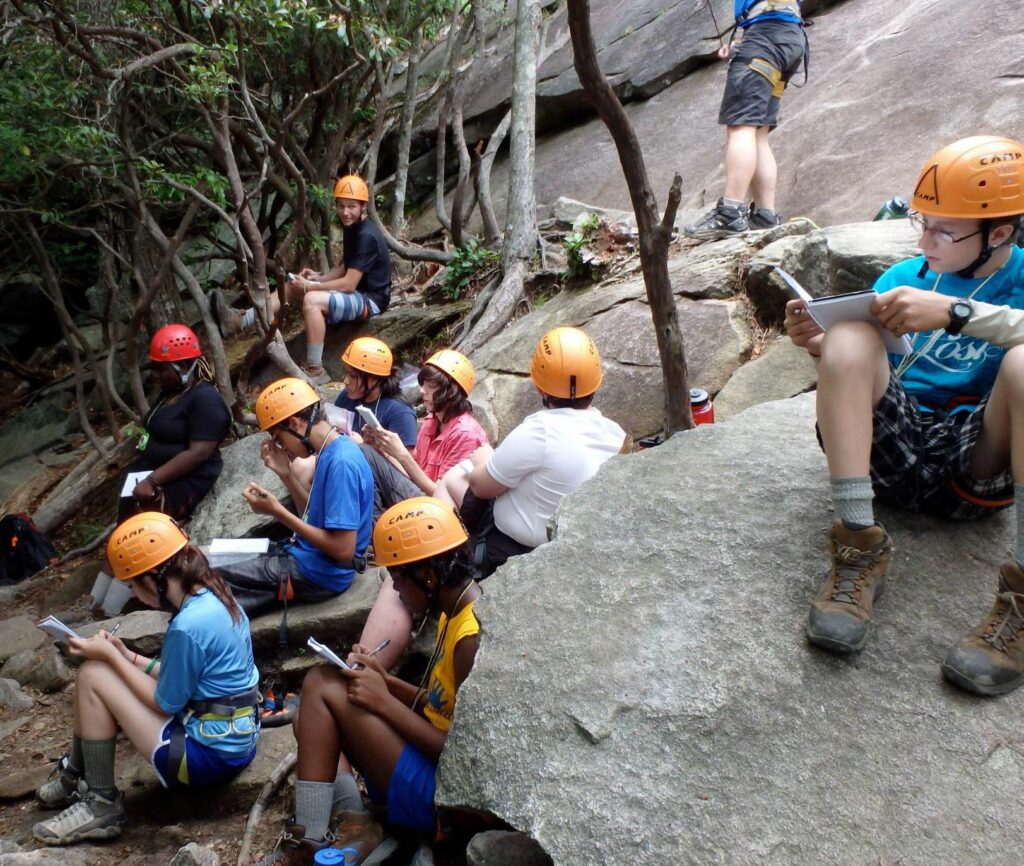
Taking a Critical Look at Traditional Education
Education in many schools can be so mundane to the point of stifling inspiration and creativity. It happened to me and it created obstacles to my learning and personal development. It even led to some unfortunate behavioral incidents I’d rather not discuss.
Didactic learning, more commonly known as (more…)
Fast Fashion Has No Place in a Leave No Trace Culture
SustainabilityOver the past couple of decades, outdoor adventure enthusiasts have developed a growing obsession with speed — fastest climber (ascent/descent), fastest cyclist, fastest downhill skier or snowboarder, fastest BASE jumper. Fastest, fastest, fastest.
Whether you actively compete in one or more of these categories or prefer a less competitive approach to human-powered outdoor activities, you’re at risk of getting swept up in the accelerating pace of everything in the world outdoor adventure, including fashion. Specifically, fast fashion.

Yes, fast fashion and stylish outdoor gear is a thing, and it’s creeping into the world of technical outdoor apparel, threatening the values of the outdoor education and adventure programming community’s Leave No Trace (LNT) culture. It’s a trend we must resist, and dare I suggest, reverse.
What Is Fast Fashion?
Fast fashion is the mass production of inexpensive clothing, aggressively marketed and pushed out to consumers as quickly as possible to capitalize on ever-changing trends. Sometimes, a simple change in color, texture, or cut is enough to trigger a new trend. Wash, rinse, repeat.
Often, products that hit store shelves or online retailers appear well-made, with quality and longevity in mind. But when put to even the most basic tests, their flaws quickly become apparent. Since many consumers are willing to overlook poor quality in their pursuit of trendy, bargain-priced clothing, the cycle continues.
What most people don’t see are the hidden costs to the environment, to the workers making these products, and to the communities where they’re manufactured. According to the report Style That’s Sustainable: A New Fast-Fashion Formula (PDF): (more…)
Managing Fatalities in Wilderness
Wilderness MedicineIn the safety and comfort of the modern world, we often forget that the natural world can be a dangerous, unforgiving, and uncaring place. For many of us who love wilderness and the backcountry, that’s large part of its attraction.
We choose to explore areas where some fear to go, and we participate in activities that may straddle the line between the safe and perilous. But we do so, backed by best practices and training in wilderness risk management.
Mountaineering, rock climbing, and whitewater rafting can be dangerous undertakings, but even a leisurely hike through the backcountry carries risk. Wilderness emergency examples include entering an area teaming with unpredictable wildlife, crossing paths with a venomous snake, getting swept up in a flash flood, or encountering other unpredictable dangers.

Here at The National Center for Outdoor & Adventure Education (NCOAE), we take many precautions to mitigate the risks. Education, training, planning, and preparation can all limit the risk of injuries and preventable illnesses, and wilderness medicine training can help mitigate the fallout when injuries and illnesses do occur in remote settings.
But when we venture out into wilderness and engage in extreme activities, accidents can and do happen, sometimes the result of life-ending episodes. Unfortunately, we need to be prepared for that, too.
Gauging the Risk of Fatality
A quick check of the American Alpine Club’s periodical Accidents in North America Climbing shows that of 8,000-plus accidents covered over the more than 75 years the club has been gathering data, more than (more…)
Managing Mass Casualty Incidents in the Backcountry
Wilderness MedicineMost people think of wilderness medicine as providing medical care in a remote setting where access to conventional healthcare resources is limited or unavailable. They imagine someone treating a wound, applying a tourniquet, performing CPR, or fashioning a splint out of sticks and a bandana enabling a hiker with a broken leg to hobble to safety.
Few rarely consider the role of wilderness medicine in mass casualty events such as earthquakes, flash floods, wildfires, and other natural and manufactured disasters. These incidences result in multiple injuries that can overwhelm the resources available to treat the injured.
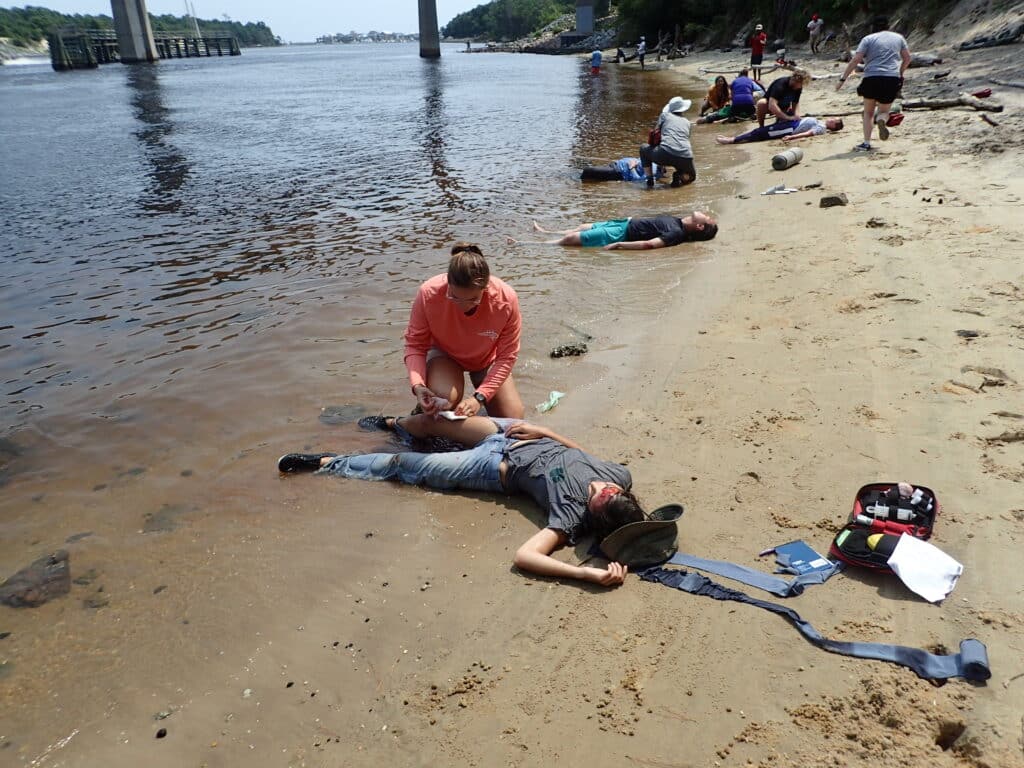
In the context of a mass casualty event, wilderness medicine providers fill all their traditional roles — caring for the injured and improvising to overcome the lack of medical equipment and supplies. However, their role often expands in scope as they face the challenges of assisting multiple patients at the same time suffering from diverse injuries.
Meeting this challenge requires knowledge of the system and resources available, along with an ability think and act quickly and rationally in order to triage patients. That means sorting and prioritizing patients on larger scale, based on the severity and urgency of their medical needs — again in the context of available resources.
Defining “Mass Casualty Incident”
A mass casualty incident (MCI) is any (more…)
Celebrating 2024: A Year of Growth, Innovation, and Milestones at NCOAE
Life At NCOAEThe year 2024 was another great one for The National Center for Outdoor & Adventure Education (NCOAE). From groundbreaking program launches to prestigious accreditations, we’ve continued to grow, innovate, and strengthen our commitment to education and adventure. Here’s a look at our top milestones from 2024:
Celebrating 15 Years of Excellence
In 2024, we celebrated a major milestone: our 15th anniversary. Over the past decade and a half, NCOAE has grown from a vision into a leading outdoor education and adventure programming organization, impacting thousands of lives through our innovative programs. This achievement reflects the passion, dedication, and trust of our community, as well as the vision of our founders and faculty and staff that continue to buy into the NCOAE educational framework.

Here’s to the next 15 years of adventure and growth!
Cognia Accreditation
This year, we learned that our accreditation from Cognia — an esteemed global organization representing the largest network of accredited institutions — is in its final stage of approval. Cognia is comprised of three of the six U.S. recognized regional accrediting agencies, including the Southern Association of Colleges and Schools Council on Accreditation and School Improvement (SACS CASI), the North Central Association Commission on Accreditation and School Improvement (NCA CASI), and the Northwest Accreditation Commission (NWAC). Together, they form the largest and most recognized community of accrediting institutions in the world.
For NCOAE, Cognia accreditation ensures our academic credits are recognized and transferable across schools nationwide and internationally. Cognia accreditation also underscores our commitment to delivering exceptional educational programs that empower students to achieve their academic objectives in non-traditional ways.
Expanding EMT Training to Idaho
We officially became a recognized Proprietary School in Idaho through the Idaho State Board of Education. Our new satellite camp in Idaho offers Hybrid EMT Training in a stunning wilderness setting, blending immersive, hands-on learning with state-of-the-art facilities. This expansion furthers our objective to make EMT certification accessible to more students.
Self-Paced EMT Certification
Speaking of EMT education that meets the needs of busy students and professionals, we launched our Self-Paced EMT Certification Course in North Carolina and Oregon. This flexible program allows students to gain life-saving skills on their schedule, combining rigorous coursework with real-world applications. It’s the perfect solution for anyone passionate about emergency response but balancing demanding commitments.
High School Semester Programming
In 2024, we finalized our plans for launching our first-ever High School Summer Semester, giving rising 10th and 11th graders a unique opportunity to earn academic credits while embarking on 32-day outdoor adventures in North Carolina, the Pacific Northwest, and Ecuador. With courses in honors Natural Science, Outdoor Leadership, and certifications in Wilderness Medicine, this program sets students up for success in education and life.
Sharing Our Story on the “It’s In the Experience” Podcast
Our co-founders Zac and Celine Adair shared their journey on the Association for Experiential Education’s (AEE) podcast, “It’s In the Experience.” In Episode 15, titled Overcoming Challenges: Creating Positive Experiences in Experiential Education, they reflected on NCOAE’s origins, challenges, and triumphs. The interview offers an inspiring glimpse into our mission and vision.
27 New Blog Posts
In 2024, we enhanced our online presence with 27 new blog posts, covering topics from outdoor education and adventure programming to emergency wilderness and urban medicine. Our blog continues to serve as a valuable resource for educators and students alike, providing insights into life in the outdoor and experiential education community.
As we look back on 2024, we’re filled with gratitude for the milestones we’ve achieved and the community that has supported us along the way. Together, we’re shaping the future of outdoor and adventure education — and we can’t wait to see what’s next.
Thank you for being part of our journey!
Intensive Self-paced EMT Certification Course for Oregon and North Carolina
EMT TrainingFinding a local EMT certification course provider and fitting the training into a busy schedule may seem like an insurmountable obstacle, especially if you’re still in school, working a full-time job — or both.
The solution? The National Center for Outdoor and Adventure Education’s (NCOAE’s) Intensive Self-paced EMT Certification Course, which gives you the freedom to learn at your own pace, from anywhere.
This flexible EMT certification in Oregon and North Carolina is designed for people who are passionate about emergency response, the Intensive Self-paced EMT Certification Course offers a comprehensive, hands-on approach to learning that combines in-depth coursework with practical, real-world applications.
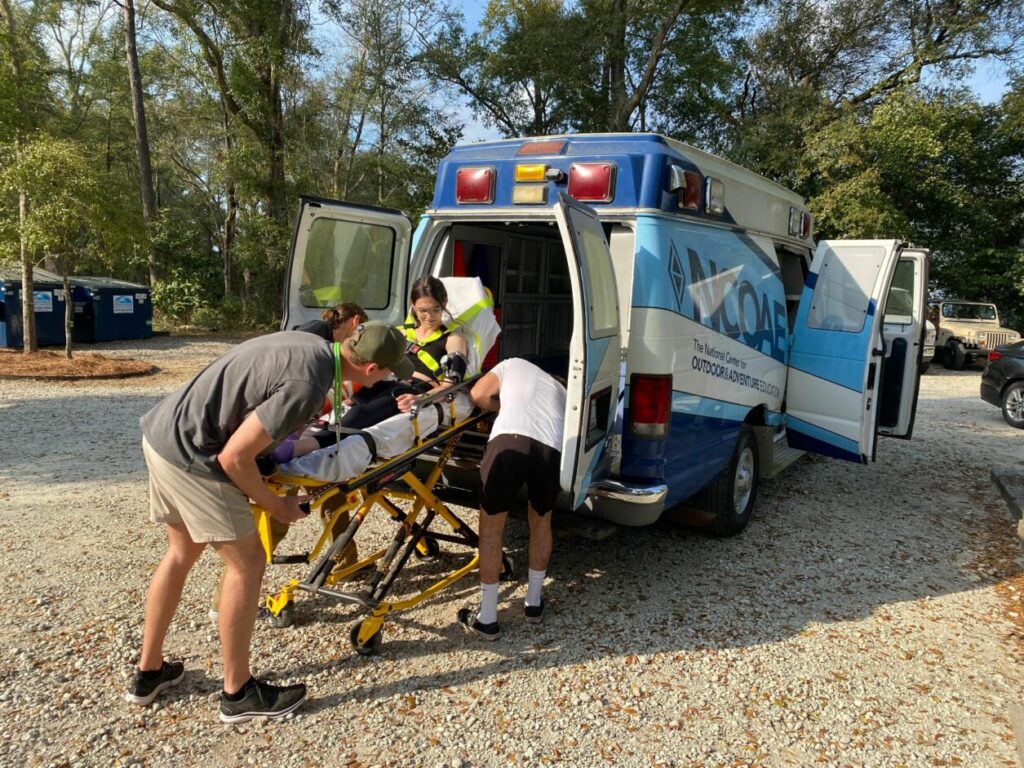
With expert instructors, engaging online content, and field training opportunities, this flexible EMT course is tailored to meet the needs of busy learners. Ready to dive in? In this post, we share most of what you need to know about this unique course offering from NCOAE, point you to sources where you can find additional details and provide the many benefits of Self-paced EMT Training.
About the Intensive Self-Paced EMT Certification Course
Our team designed this 240-hour self-paced EMT training course to be comprehensive, practical, and efficient. The curriculum is divided into two phases: (more…)
Backcountry Guide . . . Outdoor Educator . . . What’s the Difference?
Outdoor EducationIf you’re considering a career in the field of outdoor education and adventure programming that involves leading groups through remote wilderness areas, your career path will come to a fork in the road where you will face an important choice: Do you want to become a backcountry guide or an outdoor educator?
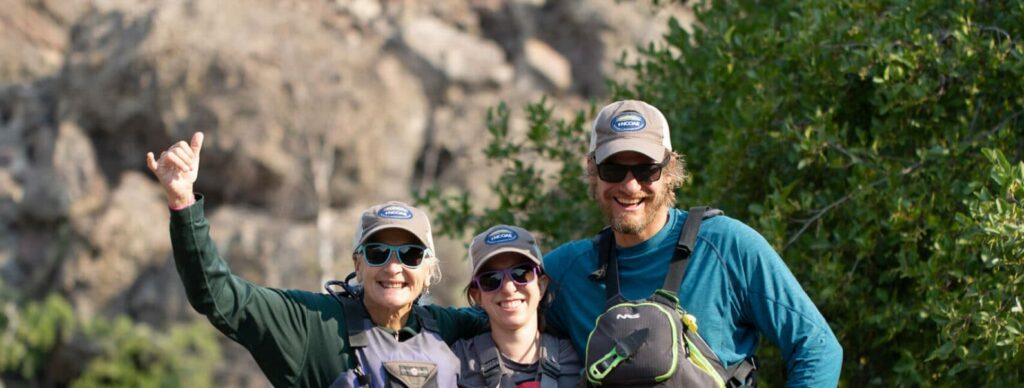
At first glance, these two roles may appear to be too similar to matter, but they serve distinct purposes. While both require expertise in risk management, their focus and approach differ considerably. In general, the differences boil down to the following:
- A backcountry guide is primarily responsible for leading groups safely through remote, rugged environments, with a focus on navigation, logistics, health, and safety.
- An outdoor educator or field instructor does everything a backcountry guide does but with the added responsibilities of teaching wilderness skills, fostering environmental stewardship, and creating opportunities for individual and group personal growth and learning.
In this post, we explore the key similarities and differences between these two roles and what each brings to the outdoor experience.
Recognizing the Similarities
Backcountry guides and outdoor educators (field instructors) are more alike than they are similar. They both have a passion for nature and human-powered outdoor recreation and adventure, and they both share their technical outdoor knowledge and skills freely with others. More specifically, backcountry guides and outdoor educators share the following qualities: (more…)
Testing for EMT Certification: Past, Present and Future
EMT TrainingEmergency medical technicians (EMTs) play a vital role in the modern healthcare system, providing immediate, life-saving assistance to people experiencing acute medical conditions or traumatic injuries. By rapidly assessing and treating patients in critical situations, EMTs improve survival rates, minimize complications, and optimize treatment outcomes.
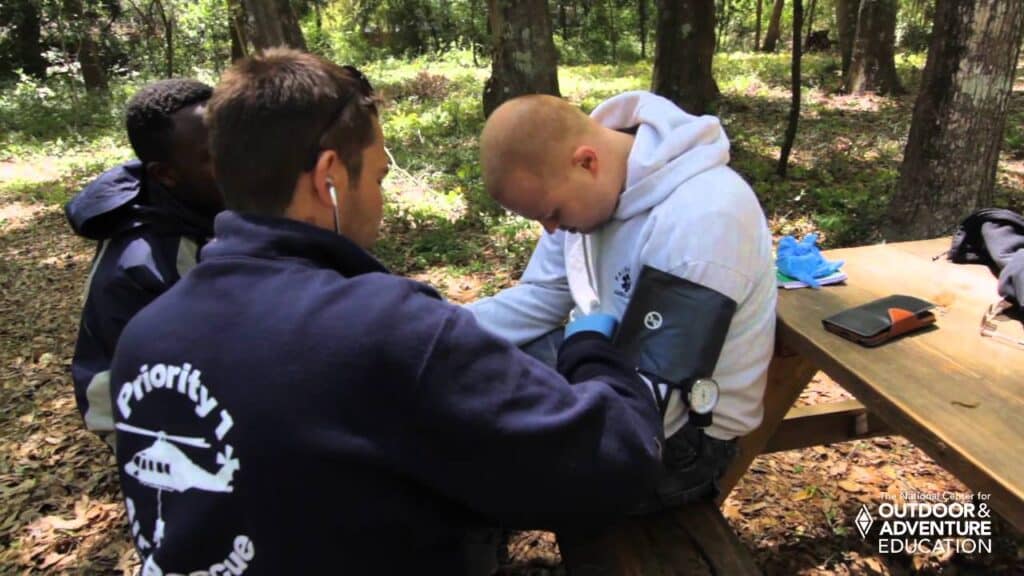
Training, testing, and certification ensure all EMTs have the skills needed to respond to life-threatening emergencies. In this post, we explore the history of EMT training and certification, bring you up to speed on its current state, and look ahead to its future. Why this matters to us here at The National Center for Outdoor & Adventure Education (NCOAE) is because we offer such training for EMTs throughout the U.S.
The Evolution of EMT Testing: Past to Present
EMT testing and certification have evolved over the course of nearly six decades. Formalized training didn’t begin until the late 1960s. It was initiated by the publication of a white paper in 1966 titled, “Accidental Death and Disability: The Neglected Disease of Modern Society.” The paper was in response to increasing trauma and death resulting from traffic accidents in the United States.
Up to that time, ambulance services generally consisted of team members with little to no formal training, with such services often relying on volunteers. And any formalized training and testing that was being done was administered locally by (more…)
EMTs Come to the Rescue in Natural Disasters
Emergency MedicineThe morning of September 26, 2024, saw the peaceful mountain towns of western North Carolina waking up to their usual weather notifications. Even though the area was accustomed to storms, information about Hurricane Helene caused worry because it was growing stronger at a faster pace than anticipated.
The stronger the storm became, the greater the responsibilities of local Emergency Medical Technicians (EMTs). From organizing for the possibility of extensive evacuations to offering essential treatment in hazardous and uncertain settings, EMTs were at the ready.
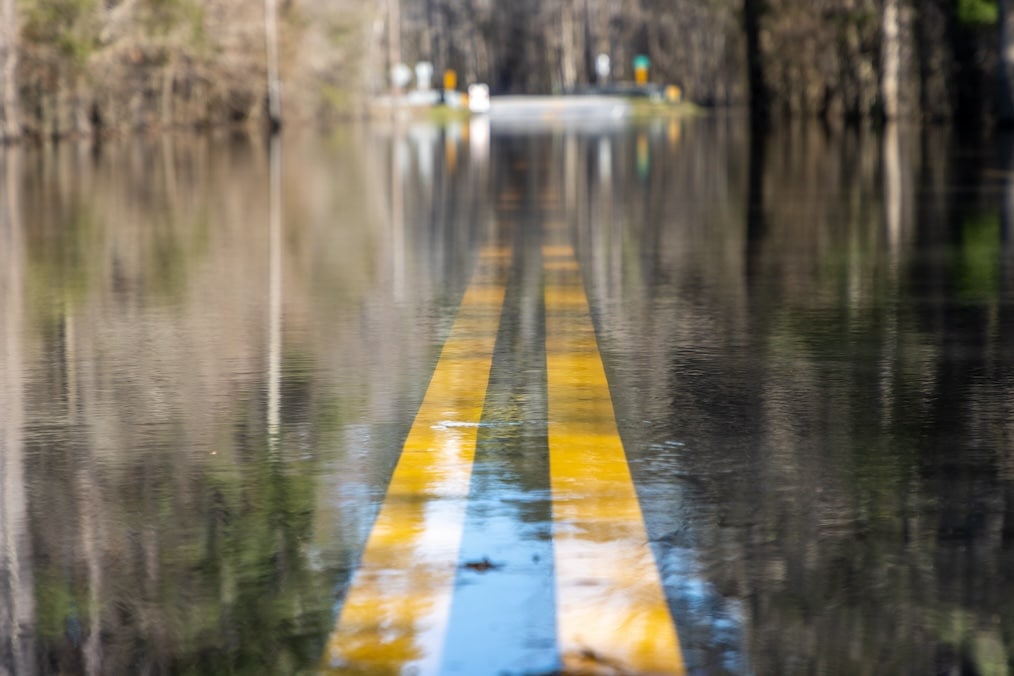
Two recent hurricanes — Helene and Milton — serve as stark reminders that natural disasters can strike with little warning, leaving a trail of chaos and devastation in their wake. Saving lives and keeping people safe during a disaster, and cleaning up in its aftermath, requires the coordinated efforts of a diverse army of professionals, including doctors, police, members of the military, heavy-equipment operators, carpenters, electricians, plumbers, and more.
Also on the front lines are EMTs, such as the ones we train here at The National Center for Outdoor & Adventure Education, typically serving as part of the local rescue response. National emergency services, including the military and larger medical teams, are usually dispatched later. But they also require the dedication and expertise of EMTs.
In this post, I explore the indispensable contributions of EMTs during natural disasters, highlighting their training, the challenges they face, and the profound impact they have on (more…)
Understanding Wilderness CPR
Wilderness MedicineImagine hiking with a small group of friends or family members in a dense, remote forest. You’re ascending a steep, rocky ravine, when suddenly a member of your group, a middle-aged man with a stout build, clutches his chest and collapses to the ground. Everyone rushes to his side, their voices rising in panic. They all reach for their phones to dial 911, but nobody can get a signal. The nearest medical facility is miles away.
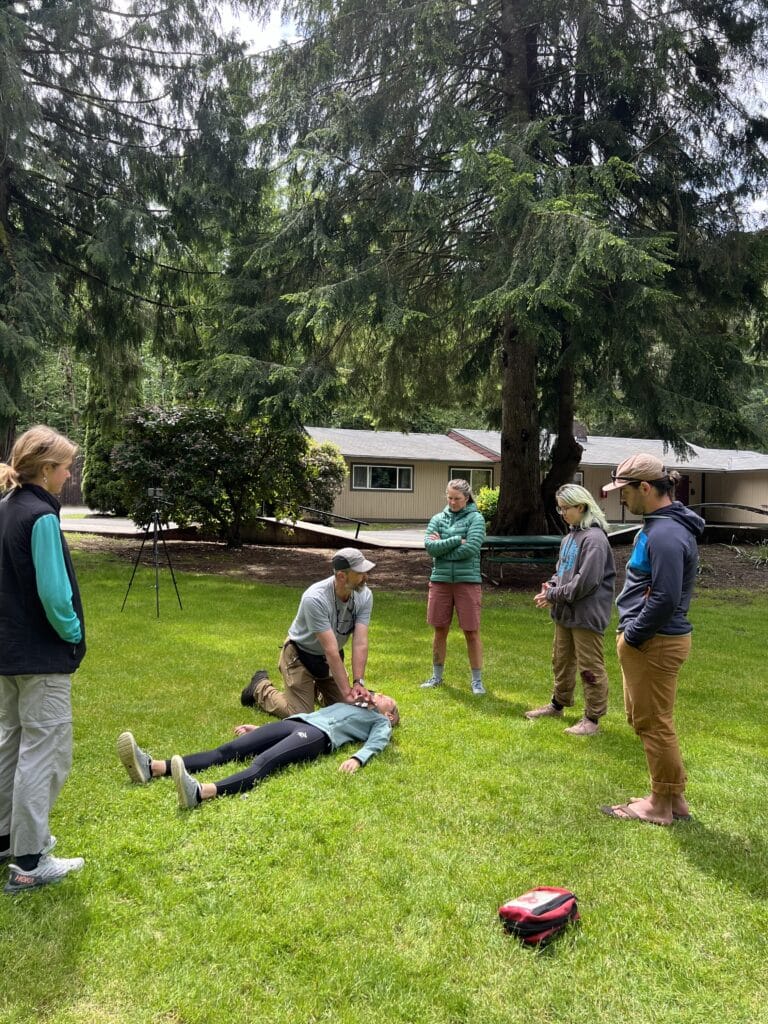
The only hope is that someone in the group is trained in cardiopulmonary resuscitation (CPR). Unfortunately, most CPR training is provided in the context of urban settings, including the workplace, community gathering spaces, and our homes. In a remote wilderness environment, responding to a cardio event requires additional skills along with mental calmness and agility — skills and abilities developed and practiced as part of Wilderness First Aid with CPR training.
What Is Wilderness CPR?
Wilderness CPR involves providing life-saving care in remote settings with limited access to medication, medical gear, and emergency medical services. The First Aid component covers everything from assessing situations and injuries/illnesses to treating common injuries, such as cuts, bruises, sprains, broken bones, head trauma, and spinal injuries. It also covers life-threatening conditions that are common in wilderness adventure scenarios, such as hypothermia and dehydration.
The CPR component covers the process of delivering a combination of rescue breathing and chest compressions to help someone whose breathing or heartbeat has stopped.
Wilderness Care Challenges
Providing first aid and CPR in a remote wilderness environment, as compared to an urban setting, presents some unique challenges, such as the following: (more…)
Cognia Accreditation Further Demonstrates NCOAE’s Commitment to Excellence
AccreditationHere at The National Center for Outdoor & Adventure Education (NCOAE), we are known to be among the best in class among providers of outdoor education and wilderness-based adventures for youths and adults, and wilderness medical and EMT training for adults.
To that end, we are excited to announce that we are currently in the final stage of seeking accreditation with Cognia, a globally recognized nonprofit organization acknowledged by the U.S. Department of Education, that provides accreditation, certification, assessment, and professional learning services for continuous improvement to public, private, and independent postsecondary schools, among others.

NCOAE attributes its success to several qualities that set us apart from others who offer the same or similar services and experiences. These include our highly knowledgeable, experienced, and passionate leadership team and staff and our unique core curriculum, carefully crafted to positively impact each participant’s self-confidence, interpersonal relationships, and commitment to fulfilling their civic and environmental responsibilities.
But we don’t expect you to take our word for it. Several highly reputable, independent organizations have given us their seals of approval through their accreditation programs, including the Association for Experiential Education (AEE) and the Commission on Accreditation for Pre-Hospital Continuing Education (CAPCE). Further boosting our street cred is that fact that both the North Carolina Office of Emergency Medical Services and the State of North Carolina have approved us to offer an intensive 21-day EMT-Basic training curriculum.
Why Cognia Accreditation Matters
Since 1895, Cognia, most well-known as the Southern Association of Colleges and Schools-Council on Accreditation and School Improvement (SACS/CASI) rebranded about five years ago, offers research-based performance standards that are created with one end in mind — to ensure high-quality learning. They define the practices that are essential for (more…)
Meet the NCOAE Student: Robert Fox, EMT Course Graduate
Student ProfilesWithin three weeks of graduating from the Intensive Hybrid EMT course offered by us here at The National Center for Outdoor and Adventure Education’s (NCOAE), Robert Fox had obtained his national and state emergency medical technician (EMT) licenses and had a job offer in hand at a local ambulance service.
Today, this Athens, Georgia, native works full time as an EMT. In addition — and in short order — Robert in on track to attend school to become an advanced emergency medical technician (AEMT) this fall. Advanced emergency medical techs provide basic and limited advanced emergency medical care and transportation for critical and emergent patients.
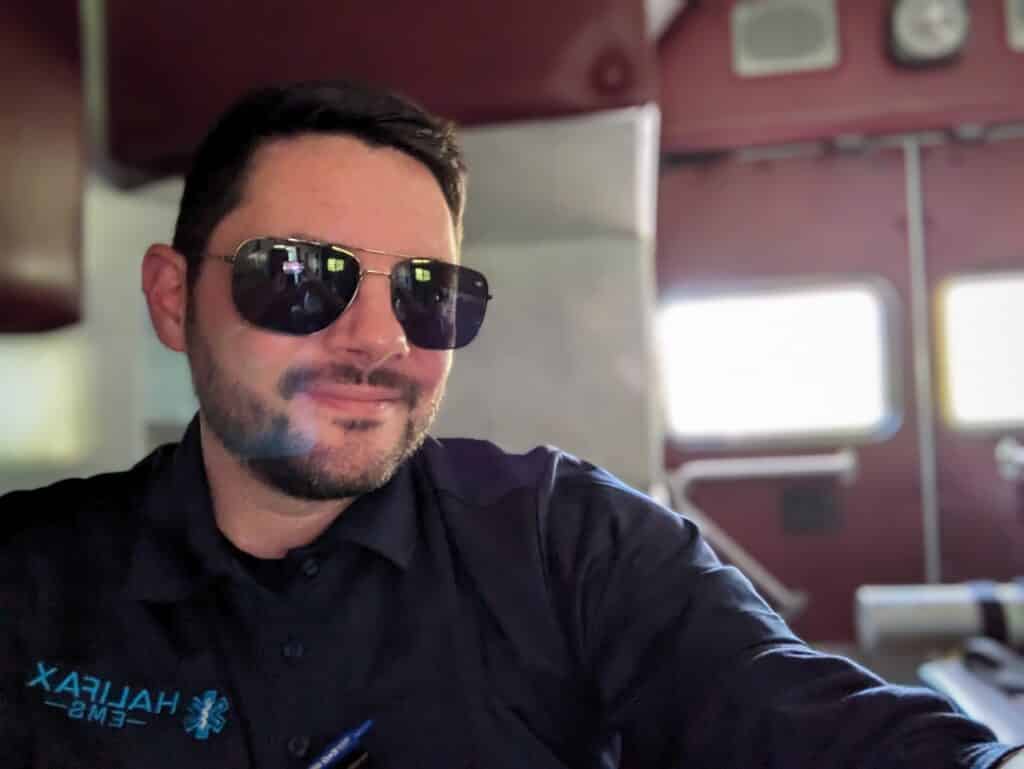
These advanced technicians possess the knowledge and skills necessary to provide patient care and transportation. And after that schooling? Robert is thinking about starting a paramedic program at a local community college.
So, what prompted such inspiration for our young graduate? Robert began his career as a senior wilderness guide, working in the field from 2007 to 2013. It was while taking a course to maintain his Wilderness First Responder certification that he became interested in more advanced emergency medical services (EMS).
But, sharing that the timing wasn’t right, Robert decided to work in behavioral health and criminal justice for (more…)
The Role of Assessment in Wilderness Medicine
Wilderness MedicineLook, listen, and feel.
If you’ve been around wilderness medicine long enough, you may remember when this was the standard teaching for determining breathing status. You place your hand on the injured party’s stomach (feel), your ear to their mouth (listen), and watch (look) to see whether their chest is rising and falling.
This method remains a foundation for assessing breathing, and its application has been expanded to cover a wider range of injuries and illnesses common in wilderness scenarios.
Look, Listen, and Feel
Look, listen, and feel is still a great way to remember that much of the assessment process (arguably the most important) comes in the form of look (visually inspect), listen (auscultate), and feel (palpate). These three actions are like the bumps on a key that align with tumblers to open a lock. In the context of emergency medicine, they form the key that unlocks the door to assessing the patient’s condition and developing treatment and evacuation plans.
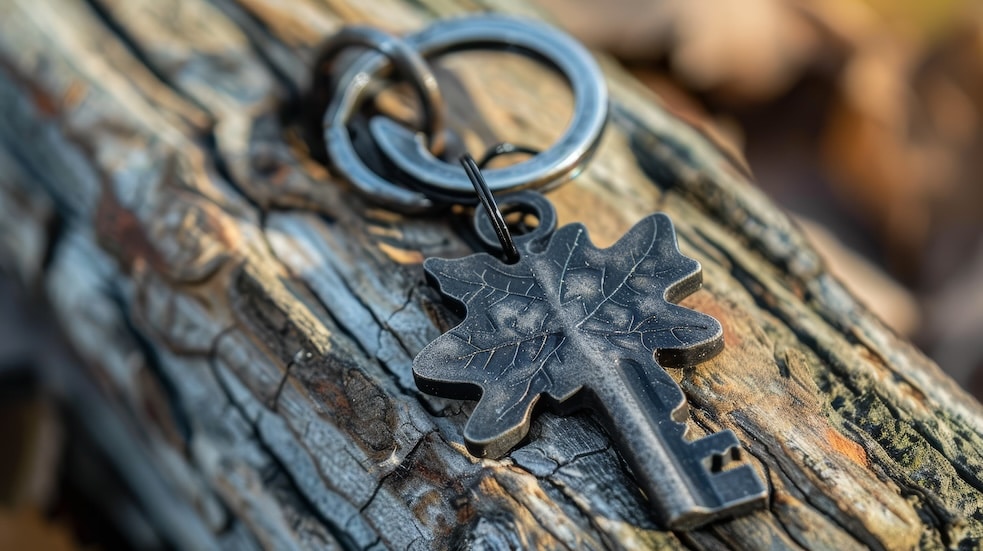
NCOAE’s Patient Assessment Process
“Assessment” is the process of determining the nature, quality, or ability of something. In the context of medical assessment, it refers to determining the realities of the patient’s condition and environment factors in order to provide appropriate care and make well-informed evacuation decisions.
In order to most accurately determine these realities, it is important to use a system of assessment that is easy to remember yet sophisticated enough to avoid overlooking vital data.
While assessment varies depending on the patient’s condition, environmental factors, and the wilderness medicine provider’s level of training and experience, The National Center for Outdoor & Adventure Education (NCOAE) patient assessment process is a wonderful example of a (more…)
Meet the Staff: Bethany Smith, Lead Field Instructor & Raft Guide
Meet the TeamBethany Smith’s journey with The National center for Outdoor & Adventure Education (NCOAE) is one marked by passion, adventure, and a deep commitment to outdoor and experiential education.
Joining our team in 2022, Bethany quickly became an important member of our field operations. After taking a brief break in 2023 to explore the world, we were thrilled to welcome her back for another season. Whether she’s navigating whitewater rapids or guiding students through challenging backcountry terrain, Bethany’s enthusiasm and expertise shine through in everything she does.
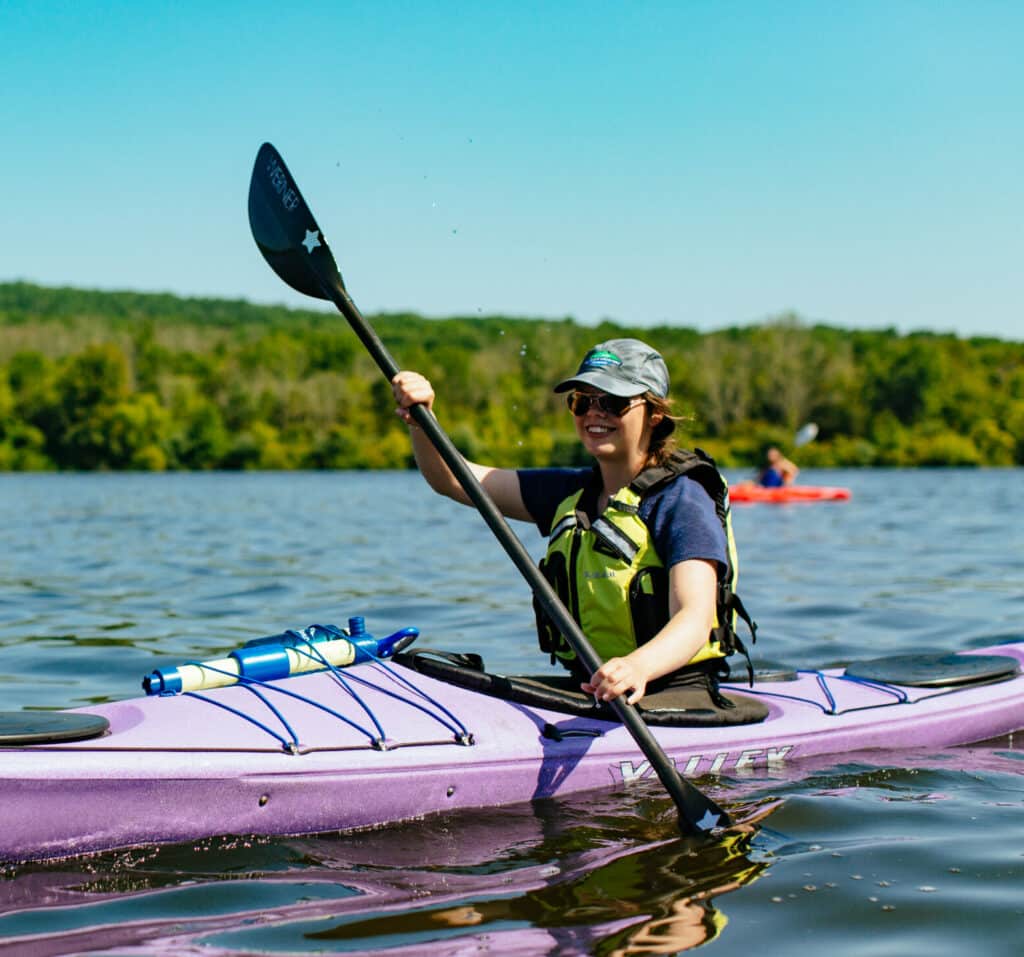
As you’ll learn, Bethany’s love for the outdoors started unexpectedly and has grown into a lifelong passion. From her early days as a raft guide to her current role as Lead Field Instructor & Raft Guide, she’s dedicated herself to helping students achieve their objectives in the outdoor classrooms offered in the backcountry. We recently sat down with Bethany to learn more about her journey, experiences, and what she loves most about working at NCOAE. Here’s what she had to say:
NCOAE: Where are you from originally, and when you’re not working in the backcountry, where do you call home?
Bethany: I was born in (more…)
Making Outdoor Recreation and Adventure More Inclusive
Outdoor RecreationWhen next you find yourself in a wilderness area, whether that be at a national park in another state or a local or state park closer to home, take a moment to look at the folks around you while you’re enjoying the flora, fauna and pristine views.
What you’re likely to notice is a lack of diversity. That’s because the majority of those who spend time in wilderness and the backcountry participating in human-powered outdoor recreational pursuits are predominately white.
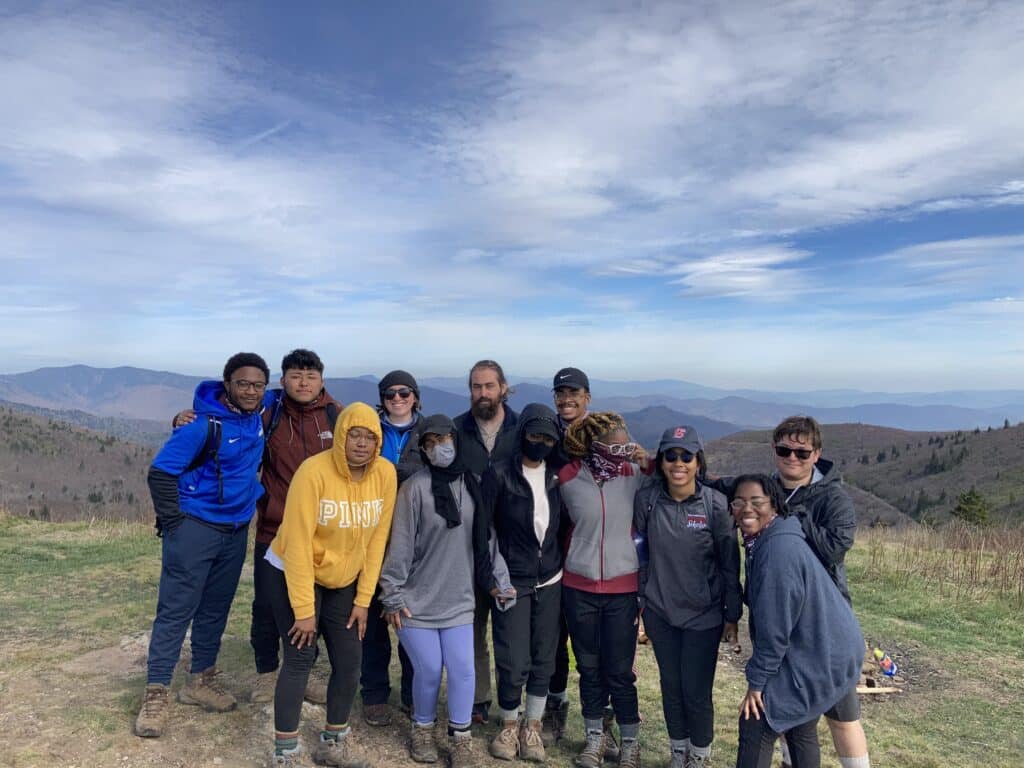
Fact is, statistics collected by the U.S. Forest Service, National Park Service, and Fish and Wildlife Service show that while people of color make up nearly 40 percent of the total U.S. population, close to 70 percent of those who visit national forests, national wildlife refuges, and national parks are white. And Blacks remain the most dramatically underrepresented group in all of these spaces.
It’s not that people of color and other underrepresented groups don’t appreciate and enjoy the outdoors. Visit an urban park — especially on a weekend — and you’re likely to see more people and activity at parks located in black and Hispanic sections of town than at parks in predominantly white neighborhoods.
The question is why? What’s keeping state and federal parks and other wilderness areas from reflecting the diversity of the overall population in this country? A good follow-up question might be what can be done to make these areas and their associated outdoor activities attractive to a more diverse population?
Exploring the Possible Reasons for the Lack of Diversity in the Backcountry
Several factors may be contributing to the lack of diversity in human-powered outdoor adventure and recreation activities. These factors can be broken down into (more…)
TALK TO US
Have any further questions about our courses, what you’ll learn, or what else to expect? Contact us, we’re here to help!